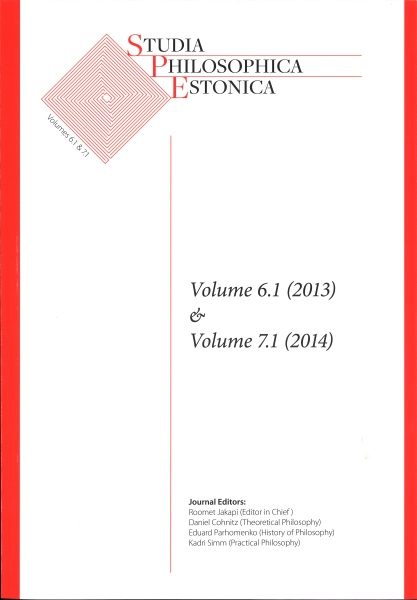Challenging Exclusionary Naturalism
DOI:
https://doi.org/10.12697/spe.2014.7.1.01Keywords:
Kornblith, conceptual analysis, naturalized epistemologyAbstract
The purpose of this paper is to reconstruct Hilary Kornblith’s (2002) argument for excluding conceptual analysis from epistemological inquiry, and then provide three objections to it. More specifically, Kornblith argues that epistemological properties such as ‘knowledge’ reduce to natural kinds (with a constitutive essence) which can only be discovered and investigated using the a posteriori methods of the natural sciences. Thus, he continues, conceptual analysis can’t properly illuminate the target domain. The three objections to Kornblith’s argument which I present are as follows: (i) Multiple Realizeability, (ii) Psychological Explanation, (iii) Starting Points. On strength of these objections, I conclude that Kornblith’s brand of a posteriori epistemology both eliminates our ability to make epistemic evaluations in general, and also implies a strong form of scepticism.
Downloads
References
Bealer, G. (1996). A priori knowledge and the scope of philosophy, Philosophical Studies 81: 121-142
Bickle, J. (1998). Psychoneural Reduction, Bradford Books/MIT Press, Cambridge, MA.
Bickle, J. (2013). Multiple realizability, in E. N. Zalta (ed.), the Stanford Encyclopedia of Philosophy, spring 2013 edn.
URL: http://plato.stanford.edu/archives/spr2013/entries/ multiple-realizability/
Bird, A. (2001). Necessarily, salt dissolves in water, Analysis 61: 267-274.
Block, N. (1997). Semantics, Conceptual Role. unpublished book chapter.
BonJour, L. (1998). In Defense of Pure Reason, Cambridge University Press, Cambridge.
Boyd, R. (1980). Materialism without reductionism: What physicalism does not entail, in N. Block (ed.), Readings in Philosophy of Psychology, Harvad
University Pre Cambridge, MA, pp. 67-106.
Boyd, R. (1988). How to be a moral realist, in G. Sayre-McCord (ed.),Moral Realism, Cornell University Press, Ithaca, pp. 181-228.
Bryson, A. and Alexander, D. (2012). the view from the armchair: Responding to Kornblith’s alternative to armchair philosophy, Essays in Philosophy 13: 161-181
Burge, T. (1979). Individualism and the mental, Midwest Journal of Philosophy
Cuneo, T. (2007). the Normative Web, Oxford University Press, New York.
Devitt, M. (1981). Designation, Columbia University Press, New York.
Fodor, J. (1974). Special sciences, or the disunity of science as a working hypothesis, Synthese 28: 97-115.
Fodor, J. (1975). Language of thought, Harvard University Press, Cambridge, MA.
Goodman, N. (1983). Fact, Fiction and Forecast, 2nd edn, Bradford Books/MIT Press, Cambridge, MA.
Horgan, T. (1993). Nonreductive materialism and the explanatory autonomy of psychology, in S. J.Wagner and R.Warner (eds), Naturalism: A Critical
Appraisal, University of Notre Dame Press, New York, pp. 295-320.
Kim, J. (1992). Multiple realization and the metaphysics of reduction, Philosophy and Phenomenological Research 52: 1-26.
Kornblith, H. (2002). Knowledge and its Place in Nature, Clarendon Press, Oxford.
Kornblith, H. (2005). Replies to Alvin Goldman, Martin Kusch and William Talbott, Philosophy and Phenomenological Research 52: 427-441.
Kornblith, H. (2007). Naturalism and intuitions, in C. Beyer and A. Burri (eds), Philosophical Knowledge: Its Possibility and Scope, Rodopi, Amsterdam,
pp. 27-49.
Kornblith, H. (ed.) (1985). Naturalizing Epistemology, MIT Press, Cambridge, MA.
Kripke, S. (1980). Naming and Necessity, Harvard University Press, Cambridge, MA.
Lynch, M. (2009). Tru0 value and epistemic expressivism, Philosophy and Phenomenological Research 79: 76-97.
McGinn, C. (1975). A note on the essences of natural kinds, Analysis 35: 178-180.
Nagel, E. (1961). the Structure of Science: Problems in the Logic of ScientifIc Explanation, Harcourt, Brace &World, New York.
Papineau, D. (2009). Naturalism, in E. N. Zalta (ed.),the Stanford Encyclopedia of Philosophy. URL: http://plato.stanford.edu/archives/spr2009/entries/naturalism/
Putnam, H. (1967). Psychological predicates, in W. H. Capitan and D. D. Merrill (eds), Art,Mind and Religion,University of Pittsburgh Press, Pittsburgh,
pp. 37-48˜.
Putnam, H. (1975). The meaning of ‘meaning’, Minnesota Studies in the Philosophy of Science 7: 131-193.
Putnam, H. (1983). Realism and Reason: Philosophical Papers, Vol. ì, Cambridge University Press, Cambridge.
Pylyshyn, Z. (1984). Computation and Cognition, Bradford Books/MIT, Cambridge.
Quine, W. (1969). Epistemology naturalized, Ontological Relativity and Other Essays, Columbia University Press, New York, pp. 69-90.
Sober, E. and Wilson,D. S. (1998). Unto Others:e Evolution and Psychology of Unselfish Behaviour, Harvard University Press, Cambridge, MA.
Tye, M. (1992). Naturalism and the mental, Mind 101: 421-441.

